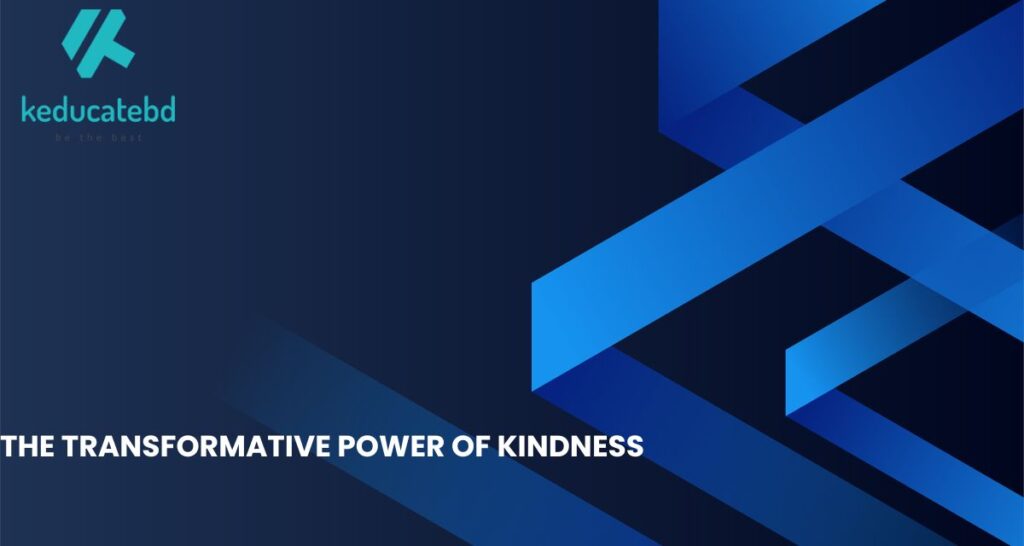Introduction:
Kindness is an elemental virtue that transcends cultures, religions, and epochs. It is a quality deeply embedded in the human spirit, often described as the act of being considerate, generous, and friendly. At its core, kindness represents a profound respect for others and a recognition of their intrinsic value. It is a behavior that goes beyond mere civility, embodying a deep-seated empathy and compassion.
The Essence of Kindness
Kindness is not merely an action; it is a state of being. It involves an understanding and appreciation of the interconnectedness of all human beings. When we are kind, we acknowledge that everyone we encounter is fighting their own battles, facing their own challenges, and carrying their own burdens. This awareness fosters a sense of solidarity and motivates us to act in ways that support and uplift others.
Philosophically, kindness can be viewed through the lens of various ethical theories. From a utilitarian perspective, kindness contributes to the greatest happiness by promoting positive interactions and reducing suffering. Deontological ethics, on the other hand, suggests that kindness is a duty, a moral obligation we owe to each other as rational beings. Virtue ethics, inspired by Aristotle, sees kindness as a fundamental aspect of a good character, essential for leading a fulfilling and virtuous life.
The Ripple Effect of Kindness
One of the most powerful aspects of kindness is its ability to create a ripple effect. A single act of kindness can inspire others to act similarly, creating a chain reaction that can transform communities and, ultimately, society. This ripple effect is beautifully captured in the concept of “paying it forward,” where one kind act leads to another, spreading positivity far and wide.
Research has shown that kindness has numerous benefits, not only for the recipient but also for the giver. Acts of kindness can reduce stress, increase feelings of happiness, and even improve physical health. These benefits underscore the idea that kindness is not a zero-sum game; it enriches both the giver and the receiver.
A Philosophical Perspective
From a philosophical standpoint, kindness is often linked to the concept of empathy, the ability to understand and share the feelings of others. Empathy is the foundation of moral behavior and ethical decision-making. It allows us to see the world from another person’s perspective and motivates us to act in ways that are beneficial to others.

Philosophers such as Immanuel Kant have argued that kindness is a fundamental moral duty. According to Kant, we have a categorical imperative to treat others with respect and consideration, regardless of our personal feelings or interests. This means that kindness is not contingent on reciprocity or personal gain; it is a moral obligation that arises from our shared humanity.
The Transformative Power of Kindness
Kindness is a profound and transformative quality that has the power to change lives and improve the world. It is a virtue that transcends cultural and religious boundaries, embodying the best of what it means to be human. By embracing kindness, we can create a more compassionate and empathetic society, one where everyone feels valued and respected.

The Ripple Effect of Kindness: A Heartwarming Tale from the Village of Compassion
In a quaint village cradled by rolling hills and verdant forests, lived a young girl named Maya, whose radiant smile and boundless kindness touched everyone she met. Her close-knit community thrived on connection, yet it faced its share of hardships. Maya’s family, though modest in means, overflowed with love and empathy, guided by her mother Anaya’s wisdom: “Kindness is the greatest wealth we can share.”

Inspired by these words, Maya vowed to weave kindness into every step of her life. One crisp afternoon, while strolling home from school, she spotted an elderly man, Mr. Singh, struggling under the weight of a heavy sack of grain. Without a second thought, she darted to his side, offering her help. Grateful and surprised, Mr. Singh accepted, and together they carried the load to his doorstep. His heartfelt thanks warmed Maya’s heart.
The next day, Mr. Singh shared Maya’s selfless act with his neighbors, sparking a wave of inspiration. Villagers began seeking ways to uplift one another—sharing harvests, assisting with chores, and offering support in tough times. Maya’s small gesture had ignited a chain reaction of generosity.
When a fierce winter storm ravaged the village, destroying homes and depleting food supplies, the community’s newfound spirit of kindness shone brightly. United, they pooled resources and rebuilt together. Maya, though young, led with courage, rallying everyone to contribute what they could. Her leadership fostered hope amidst the ruins.
During the recovery, a traveling merchant named Raj arrived, struck by the village’s resilience. Moved by their unity, he donated supplies and lent a hand. In return, the villagers embraced him warmly, sharing meals and stories. One evening, Raj captivated them with a tale of a distant land torn by division, where acts of kindness had mended rifts and fostered harmony. His words resonated deeply: kindness was a universal language, capable of transcending all barriers.
Galvanized by Raj’s story, the villagers resolved to spread their ethos of compassion beyond their borders. Led by a now-grown Maya, they visited neighboring villages, sharing their journey and inspiring others to embrace kindness. Their efforts took root, and over time, Maya’s village earned a new name: the “Village of Compassion.” Visitors from distant lands flocked to witness its legacy, drawn by stories of a community transformed by empathy.
Maya’s journey reveals the profound power of kindness. Her simple act of helping an elderly neighbor rippled outward, reshaping her village and inspiring countless others. It proves that no gesture of generosity is too small, and that compassion can bridge divides, heal wounds, and unite hearts.
A Legacy of Compassion
Kindness is a beacon in a world often clouded by adversity. It holds the power to heal, unite, and inspire. Maya’s story reminds us that each of us can spark change, no matter how small our actions may seem. As her mother taught, “Kindness is the greatest wealth we can share.” By embracing this truth, we can create a ripple effect that transforms communities and reshapes the world. Let us choose kindness, for it is the heartbeat of our shared humanity.


